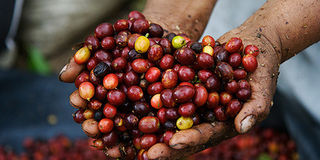Low prices fuel coffee smuggling to neighbouring countries

What you need to know:
The government is urged to find out as to whether the producer price for coffee, one of Tanzania’s leading traditional export crops, collerated with the world market price of the commodity. Low producer price has forced the farmers to smuggle coffee to the neighbouring countries where they fetched better prices.
Arusha. Low producer prices could be the reason that has forced some coffee farmers to smuggle the crop to markets in the neighbouring countries.
Stakeholders in the industry said the Sh 2,000 per kilogramme paid to the farmers at the primary societies was far below their production costs.
“The coffee industry is in deep crisis. There should be deliberate efforts to rescue it,” lamented Edna Lugano, a project coordinator with Agricultural Non-Stake Actors Forum (ANSAF), a lobby group.
She said the farmers were not happy with the prices offered at the primary societies, especially in Kilimanjaro and Arusha regions, saying coffee producers needed to be given the freedom to sell their crop to any local buyer. She was speaking to The Citizen on the challenges facing the coffee industry and possible solutions to turn around the once robust sector to the national income.
Ms Lugano said although the government had directed that all coffee be sold through the primary societies, the outlets had little capacity to undertake the task. A coffee farmer in Arusha, Regani Kisiri, said she was contemplating to abandon coffee production due to the low producer price offered at the local markets.
“I have two acres of the crop. What I get after selling it cannot cover the cost of inputs,” she lamented, noting that there had been promises that the producer price should match what was offered at the world market.
The manager of Haki Kazi Catalyst, a non-state policy analysis organisation, Mr Evance Mpamilya, said problems facing coffee farmers were also due to low investments in the sector. He said increased investments would boost production of the crop, hence higher productivity which would attract more buyers, especially in the international markets.
He, therefore, called on the government to allocate more funds to the agricultural sector, particularly the coffee industry to enable it regain its lost glory.
Until two decades ago, coffee used to contribute at least five per cent of Tanzania’s export earnings with Kilimanjaro and Arusha regions accountring for 20 per cent of 50,000 tonnes produced annually.
By 2010, however, the country’s share in the global coffee market had shrinked to a mere 0.8 per cent.
However, Tanzania is the third leading country in Africa in the production of the Arabica coffee after Kenya and Ethiopia.
In recent years, stakeholders in the industry want the producer price for the crop be raised from the present Sh. 2,000 a kilo to at least Sh. 4,000 to Sh. 5,000.
hence higher productivity which would attract more buyers, especially in the international markets.
He, therefore, called on the government to allocate more funds to the agricultural sector, particularly the coffee industry to enable it regain its lost glory.
Until two decades ago, coffee used to contribute at least five per cent of Tanzania’s export earnings with Kilimanjaro and Arusha regions accountring for 20 per cent of 50,000 tonnes produced annually.
By 2010, however, the country’s share in the global coffee market had shrinked to a mere 0.8 per cent.
However, Tanzania is the third leading country in Africa in the production of the Arabica coffee after Kenya and Ethiopia.
In recent years, stakeholders in the industry want the producer price for the crop be raised from the present Sh. 2,000 a kilo to at least Sh. 4,000 to Sh. 5,000.




